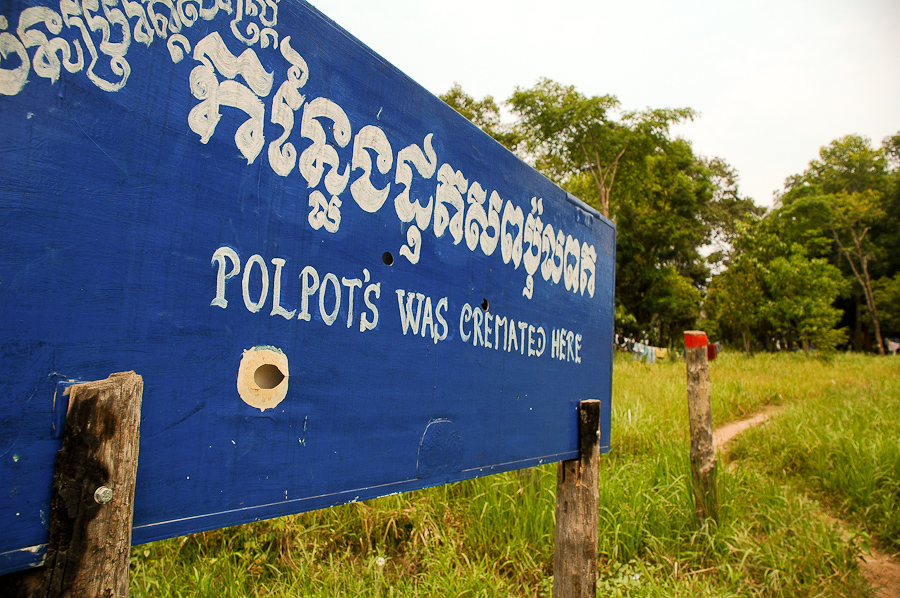The fear of knowing the truth
Anlong Veng, Cambodia
In Phnom Penh this week, a war crimes tribunal will begin long-awaited legal proceedings in a trial against four senior Khmer Rouge leaders. In schools in what was the last stronghold of the regime, children have only recently begun learning about their parents' past.
My radio piece for PRI's The World looks at how the children of one-time Khmer Rouge see their families' histories, and how former cadres explain war to the first Cambodian generation in decades to grow up without it.
At this school in the dusty town of Anlong Veng, many children have a stronger link than most to Cambodia’s dark history.
Ros Sothea is 16 years old. She’s too young to have any memories of what life was like when the Khmer Rouge ruled the country in the 1970s. But it runs in her blood. Like many of the students here, she’s a child of the Khmer Rouge.
Her father’s a former foot soldier. Sothea says he only tells her that life in those days was difficult for everyone.
“They caused a lot of problems to Cambodian families,” she says. “Some of the families lost everything because of the Khmer Rouge.”
The Khmer Rouge years are long over. The movement’s leader, Pol Pot, died an elderly man in 1998, not far from here. His grave, a makeshift affair, lined with old Pepsi bottles under a modest tin roof, lies down a dirt path off the main road.
“My parents never tell me. And as for me, I never ask.”
These days, a paved highway connects Anlong Veng to the tourist hub of Siem Reap and the famed Angkor temples. And the government, preaching reconciliation, has been eager to pave over the memories of the past.
Learning about the Khmer Rouge wasn’t a part of the school curriculum here until 2009. Some students in Anlong Veng say they know nothing at all.
Lon Dany is 21 years old. He grew up in Anlong Veng. His parents, however, never talk about what people call "the Pol Pot times".
“My parents never tell me,” he says, sitting in an empty classroom. “And as for me, I never ask.”
‘We are all Khmer Rouge’
The main highway leading to Pol Pot’s grave branches off to a dirt road a few miles out of town. Sok Bou is resting in the shade, away from the midday sun.
He sits beside a wheelchair. He’s missing both his legs—he says they were blown away when he stepped on a land mine during the years of civil war that followed the Khmer Rouge collapse.
Bou is a former Khmer Rouge soldier. He says he was forced to join the Khmer Rouge as a teenager, not much older than his children are now. He says his kids don’t ask about the Khmer Rouge--but he has nothing to hide.
“If they ask, I would say ‘I’m a Khmer Rouge,’” he says.
He slaps his palm against his chest, then he points at his neighbor’s house across the road and the house beside it.
“He’s a Khmer Rouge,” he says, “he’s a Khmer Rouge. We’re all Khmer Rouge here.”
But Bou says he doesn’t want to glorify the past. He says he tries to tell his children stories about how hard the years of war were; how they destroyed his country’s future; how they robbed him of his legs.
“Some stories we should believe. Others, we shouldn’t.”
“I don’t want them to become soldiers,” he says. “I tell them, ‘try and get an education.’ My son, he wants to be a doctor.”
Bou may not be proud of his Khmer Rouge past, but he’s not ashamed, either. Like many former soldiers here, he’s skeptical of the claims of how many died under the regime–estimated at 1.7 million.
“I know that I never killed civilians,” he says. “I never saw that with my own eyes.”
And that’s the message he would like to pass on to his children. “Some stories we should believe,” he says. “Other stories, we shouldn’t.”
“We have parents who told us if we teach the kids, the kids will hate them. And we have kids who told us that we don’t need to study because my parents were Khmer Rouge. There’s a fear of knowing the truth.”
Why we believe
But the Khmer Rouge did kill their own people. It’s estimated that at least one-quarter of the population died under the regime.
For many in the former Khmer Rouge zones, there's a fear of knowing the truth, says Youk Chhang, the director of the Phnom Penh-based Documentation Centre of Cambodia. The group compiles evidence of the country’s Khmer Rouge history.
Chhang frequently visits the former Khmer Rouge strongholds. He says many parents are afraid to tell their kids what happened, while many kids just don’t want to know.
“We have parents who told us if we teach the kids, the kids will hate them. And we have kids who told us that we don't need to study because my parents were Khmer Rouge. There's a fear of knowing the truth.”
Back in Anlong Veng, teacher Tann Sodavuth stands in her empty classroom. Her aunt and uncle were both Khmer Rouge. Another uncle was killed by the regime. She believes the history books. In Anlong Veng, she says, history is too close to home for her students not to learn.
“The Khmer Rouge killed a lot of people,” she says. “One day, if the students don’t believe, we can take them to where the leaders lived. We can see the prisons where they kept the people and punished them. That’s why we believe.”















